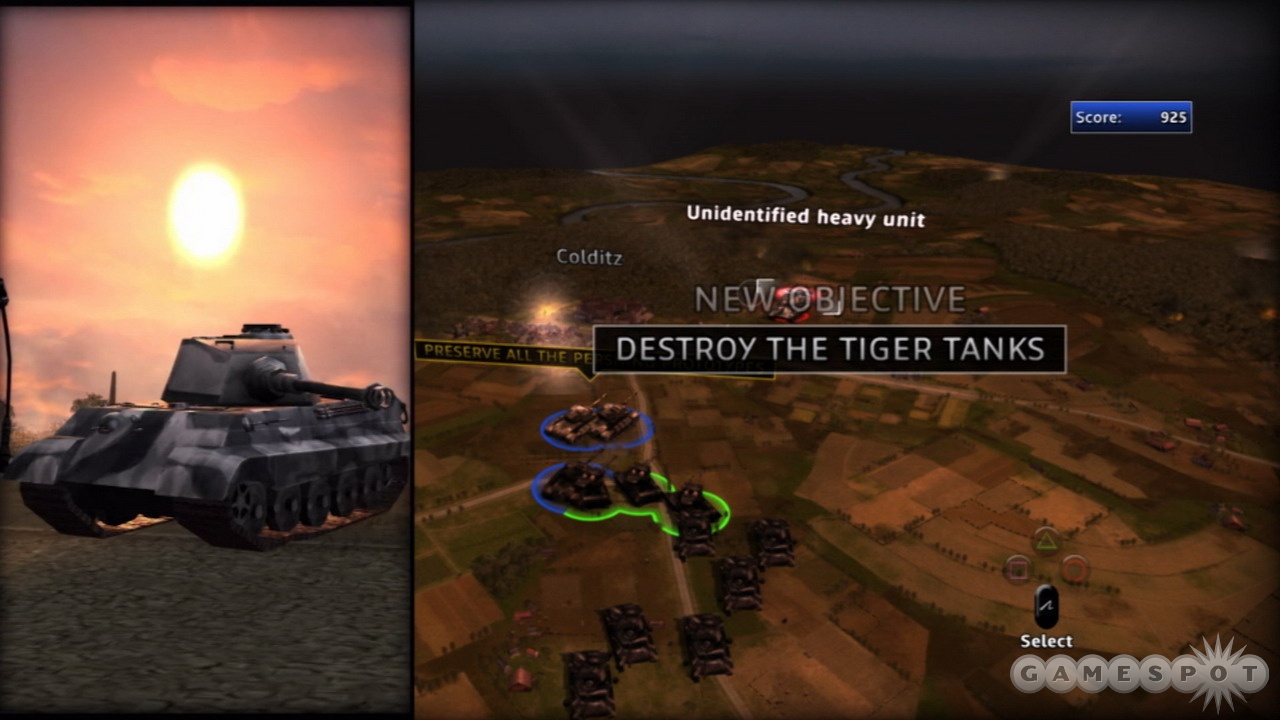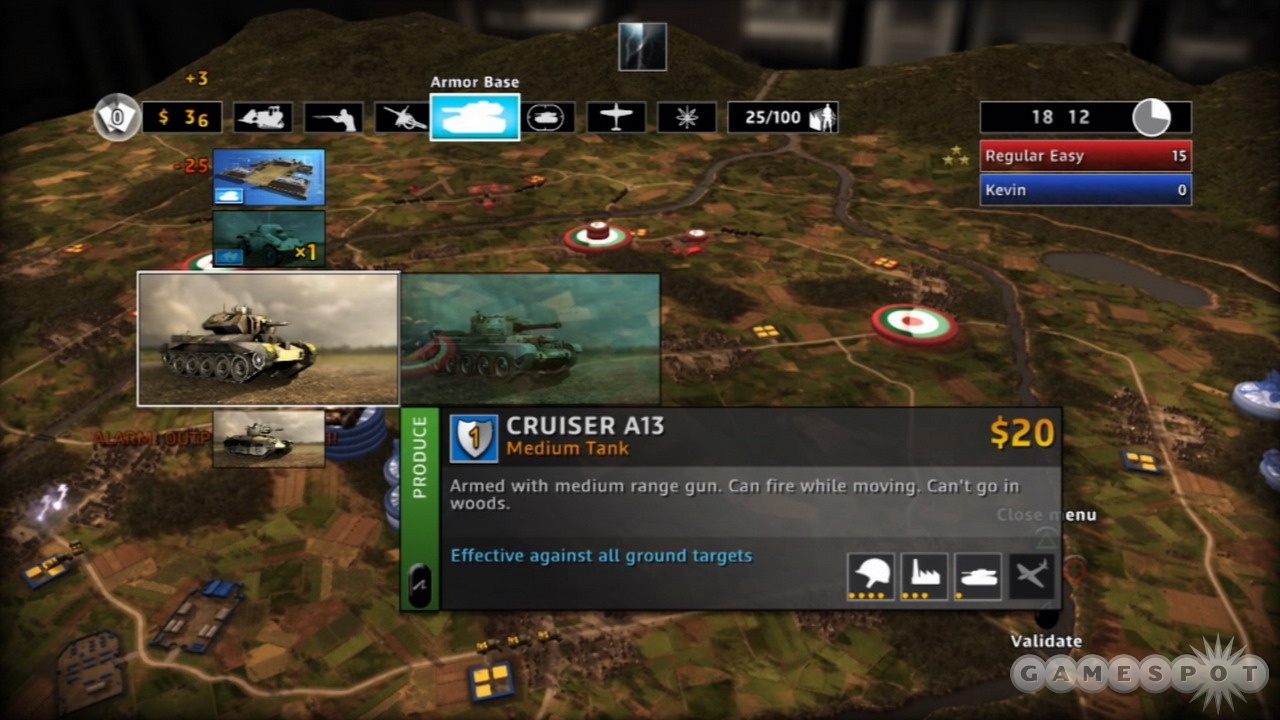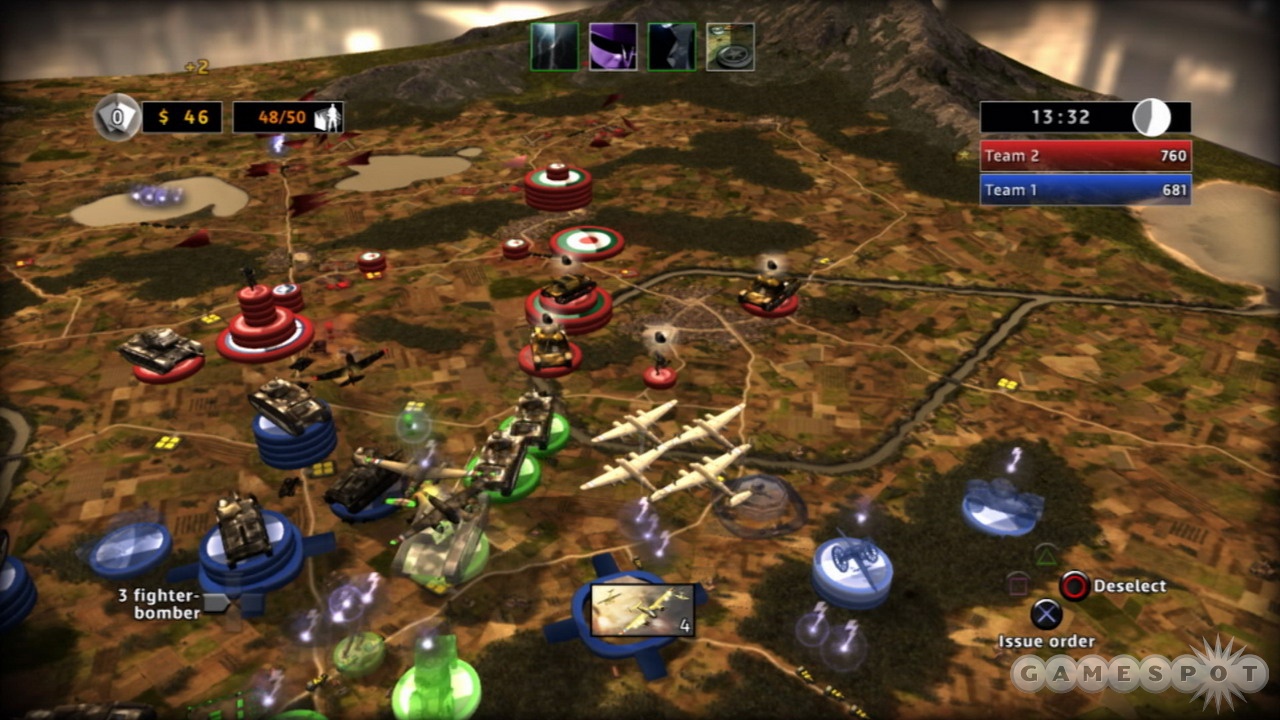R.U.S.E. is a fun and fascinating real-time strategy game, as long as you know which parts of it to invest in and which to skip entirely. It prospers in the competitive arena, putting an intriguing use of bluffs and reconnaissance to good use on expansive maps that will test your ability to control the battlefield. Offline, you get some mileage out of its single-player skirmishes, but where R.U.S.E. falters is in its plodding, poorly paced campaign. Bizarre character models and bad writing prove distracting, while too-frequent story intrusions interrupt the flow of missions just as they start to get interesting. But the clumsy campaign aside, R.U.S.E.'s unique mechanics lead to tense and enjoyable standoffs in which, literally, things are not always what they seem.
One of R.U.S.E.'s finer aspects is its ease of use, which makes it approachable for both newcomers and experts alike. When you zoom all the way out, you see the entire battlefield as if it's mapped on a general's strategy table, where units are depicted as stacks of chips. If you zoom in, you can watch and give orders to a single infantry squad or individual tank; if you zoom out, nearby units are grouped together into single stacks, which isn't just a neat effect because it enables you to command large groups of units with a single button press.
Using a standard Sixaxis or Dual Shock 3 controller, it's absolutely simple to scroll across the map, issue orders, and queue up additional units. R.U.S.E. also supports the PlayStation Move controller and supplementary navigation controller, which allows you to point at the screen to select units. Unfortunately, this alternate method of managing battles is far inferior to using a standard gamepad. To zoom in and out, and to rotate the camera, you hold the T button and maneuver the Move controller, which is much less precise than using an analog stick. Furthermore, the placement of the main buttons for selecting multiple units at once and bringing up the order interface make using the motion controller somewhat awkward. The requirement for you to keep pointing the controller at the screen at all times, even during cutscenes, further rubs salt in this wound; should you rest your arms during a cinematic, the game will pause the scene and tell you to move the controller back in range of the camera. For the best experience, stick to a standard controller and forget playing R.U.S.E. with motion controls.
There's a certain simplicity to R.U.S.E. that may at first turn veterans off; there are limitations to where certain structures can be built, tech upgrades are very elementary, and you can't set up patrols or assign units to guard others. But once you get wrapped up in the game's more unique attributes, you discover that this RTS isn't as simple as it first appears. It mixes up the standard real-time strategy model by employing ruses, which are special skills that allow you to fool your opponent or reveal his or her secrets in a variety of interesting ways. Maps are divided into segments in which you can activate these ruses, and there are limitations to how often you can use them and how many can be active in a particular sector at a given time. Games are won and lost with these ruses. Perhaps you will send in a squad of decoy ground units so that you can distract your opponent's front lines while you attack from the rear. Or maybe you would rather send bombers to attack an oncoming prototype tank from the skies after activating the terror ruse, which causes enemy units to rout much more quickly than normal. There's a tremendous amount of satisfaction in seeing your plans come together or in foiling your adversary. Hide your buildings from view and spoil the opposition's attempt to destroy your airfield. Use radio silence to sneak antitank defenses and artillery into firing position and then use your spies to unveil their units. Ruses open up possibilities you've never seen in a strategy game before, and it's a blast to create new ways of playing on the fly just to see where they lead.
R.U.S.E. is at its best online, where you choose one of six nations and battle it out on maps that support up to four players. Each nation is similar enough to make it comfortable to switch from one to the next but different enough to open up fun new ways of playing. Perhaps light tanks may be available to you even if you've just built a barracks, or perhaps you will have access to a flexible defensive emplacement that fires both antitank and antiair salvos. Regardless of which country you choose, reconnaissance is key to success: Your units will only automatically fire if the enemy's units are actively spotted by recon vehicles (or perhaps, revealed with the spy ruse). Environmental cover is another important factor. Certain units, such as heavy infantry, can be placed in woods or in cities, where they are usually hidden from the enemy's view and will ambush units that happen upon them unexpectedly. Things often get intense because there are so many ways of playing but only so many resources flowing in at any given time. If you play smartly, you can capture enemy resource nodes with your infantry. But if you get careless, you might lose an entire battalion of tanks to a few infantry units hidden in a forest near a strategic road juncture. The only real downsides online, minor though they are, are the forced unit limit and time limit, attributes not present in the PC version of the game.

You can play offline, of course, and one-off skirmishes and challenges do a fine job of keeping you entertained. It's too bad that R.U.S.E.'s mediocre campaign fails to employ the strengths of its core gameplay. Certainly, you shouldn't play it for its story: second-rate voice acting and weird-looking character models with crude facial creases make the poorly lit cutscenes almost uncomfortable to watch. Some of the dialogue is truly awful; a truth you come to hysterical grips with in a serious scene gone inadvertently campy that prominently features the word "nuts." The plot follows the rise of Major Joe Sheridan as he rises up the ranks of the US Army in World War II while struggling with the onslaught of German troops that always seem to be one step ahead of him. This isn't a gripping tale, yet it has a tendency to frequently and annoyingly intrude on your missions. Every few minutes, the game will yank control from you just as you are getting into the swing of things, swoop the camera around the battlefield while you hear another mission update, and reset the camera in a position other than the one in which it started. Other times, new units and story updates will be introduced in slide-in panels as you play, which also limits your view of the battlefield and slides the interface out of position. Not only do these constant amateur narrative invasions mess with the tempo, but they also temporarily mess with your view of the battlefield. Most every aspect of the storytelling is poorly conceived and inexpertly delivered.
The missions hold your hand well into the lengthy campaign, and at that point, you'll be longing for the game to trust in your ability to play it and let you take command of a full-fledged battle. A new ruse is introduced every few chapters and new units are fed to you at a slow pace. The upside is that you have time to come to grips with each new ruse and unit and can fully understand their best uses for deployment. The downside is that if you've played a strategy game before, you'll be itching for something more interesting than battles featuring a limited army and limited resource management. R.U.S.E.'s campaign is fairly easy and strategically simple until you reach the end, at least on standard difficulty. The final missions will test your strategic prowess, though a few of them don't test your flexibility and know-how as much as they test your ability to understand exactly what the game expects of you. In some cases, you are placed in tightly scripted scenarios with very specific counters. These missions play out more like puzzles than strategic tests of skill and aren't a whole lot of fun. All the flaws with the campaign undermine a clever and fun foundation that deserved a chance to excel, but it suffers from too many limits for too long a stretch. 
The game performs well, letting you zoom in and out with ease without any noticeable slowdown, though it would seem that some compromises have been made to accommodate the overall scope. Neither the terrain nor the units are all that detailed when viewed at relatively close distances. The art design also doesn't make any statement beyond "generic World War II," and overall, this version looks decidedly less crisp than the others. Yet, it's still a fine-looking game that displays a lot of units doing a lot of things at once without a struggle, though you will notice some geometric and texture pop-in. In the same way, the boilerplate wartime soundtrack sets the right tone, if not exactly excelling. But it isn't the presentation's strengths and weaknesses that will strike you as much as R.U.S.E.'s fascinating twist on a standard genre. It's unfortunate that the spiritless campaign fails to elevate R.U.S.E. to the head of its class. And yet, when it's allowed to breathe--both online and in one-off skirmishes--it's a flexible strategy game that requires you to think differently. Every game follows a unique path, requiring lots of smart recon and using ruses to fool your enemy. If you can look past the foibles, you'll find R.U.S.E. to be a fun and occasionally intense real-time strategy game that's just unusual enough to catch your imagination.
